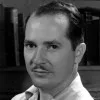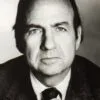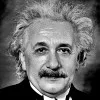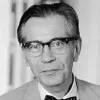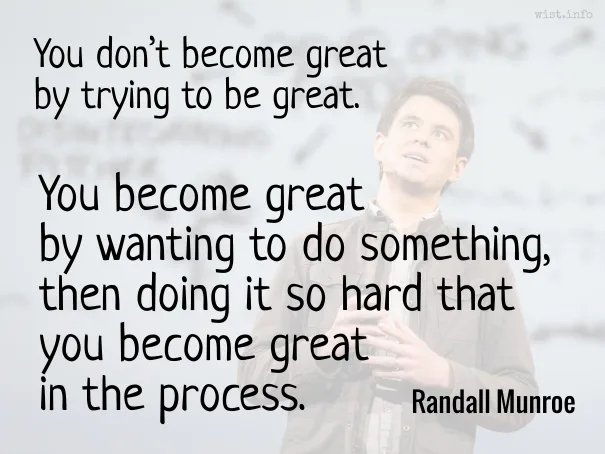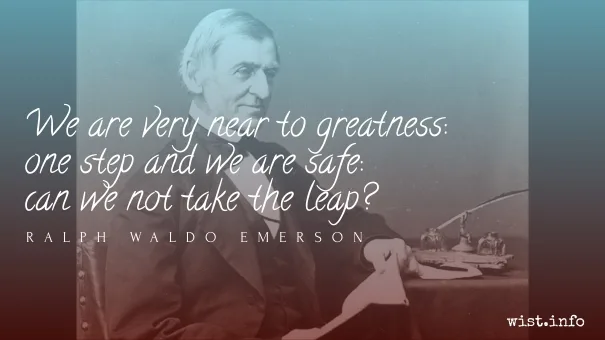People keep working in a freelance world, and more and more of today’s world is freelance, because their work is good, and because they are easy to get along with, and because they deliver the work on time. And you don’t even need all three. Two out of three is fine. People will tolerate how unpleasant you are if your work is good and you deliver it on time. People will forgive the lateness of the work if it’s good, and if they like you. And you don’t have to be as good as the others if you’re on time and it’s always a pleasure to hear from you.
Neil Gaiman (b. 1960) British author, screenwriter, fabulist
Speech (2012-05-17), Commencement, University of the Arts, Philadelphia [14:10]
(Source)
Quotations about:
excellence
Note not all quotations have been tagged, so Search may find additional quotes on this topic.
Everybody keeps calling for Excellence — excellence not just in schooling, throughout society. But as soon as somebody or something stands out as Excellent, the other shout goes up: “Elitism!” And whatever produced that thing, whoever praises that result, is promptly put down. “Standing out” is undemocratic.
Jacques Barzun (1907-2012) French-American historian, educator, polymath
Essay (1991), “Schooling No Mystery,” Begin Here: The Forgotten Conditions of Teaching and Learning, ch. 1
(Source)
There is no uniform of excellence, either in physical or spiritual nature: all genuine things are what they ought to be. The reindeer is good and beautiful, and so likewise is the elephant. In literature it is the same.
Thomas Carlyle (1795-1881) Scottish essayist and historian
“Jean Paul Friedrich Richter,” Edinburgh Review No. 91, Art. 7 (1827-06)
(Source)
A review of Heinrich Döring, Jean Paul Friedrich Richter's Life, with a Sketch of His Works (1826).
Anyone who has achieved excellence in any form knows that it comes as a result of ceaseless concentration. Paying attention.
Louise "Lulu" Brooks (1906-1985) American film actress, dancer, writer
Lulu in Hollywood, ch. 5 “The Other Face of W. C. Fields” (1982)
(Source)
Writing of Mack Sennett.
It is erroneous to tie down individual genius to ideal models. Each person should do that, not which is best in itself, even supposing this could be known, but that which he can do best, which he will find out if left to himself. Spenser could not have written Paradise Lost, nor Milton the Faerie Queene. Those who aim at faultless regularity will only produce mediocrity, and no one ever approaches perfection except by stealth, and unknown to themselves.
William Hazlitt (1778-1830) English writer
“Thoughts on Taste,” Edinburgh Magazine (1819-07)
(Source)
WYATT: Do you think that philosophy contribute to happiness?
RUSSELL: Yes, if you happen to be interested in philosophy and good at it, but not otherwise – but so does bricklaying. Anything you’re good at contributes to happiness.
Bertrand Russell (1872-1970) English mathematician and philosopher
Interview by Woodrow Wyatt, BBC TV (1959)
Collected in Bertrand Russell's BBC Interviews (1959) [UK] and Bertrand Russell Speaks His Mind (1960) [US].
We are so caught in the myths of the best and the brightest and the self-made that we think outliers spring naturally from the earth. We look at the young Bill Gates and marvel that our world allowed that thirteen-year-old to become a fabulously successful entrepreneur. But that’s the wrong lesson. Our world only allowed one thirteen-year-old unlimited access to a time sharing terminal in 1968. If a million teenagers had been given the same opportunity, how many more Microsofts would we have today?
Malcolm Gladwell (b. 1963) Anglo-Canadian journalist, author, public speaker
Outliers: The Story of Success, Part 2, ch. 9 (2008)
(Source)
Expect of the young the very best of which they are capable, and you will get it. Expect less, and it is only too likely that you will get no more than you expect.
Bertrand Russell (1872-1970) English mathematician and philosopher
“On National Greatness,” New York American (1932-01-20)
(Source)
If you have to do it every day, for God’s sake learn to do it well.
Mignon McLaughlin (1913-1983) American journalist and author
The Neurotic’s Notebook, ch. 4 (1963)
(Source)
Wherefore, we must not think it sufficient that we do any thing merely well; but we ought to make it our study to do every thing gracefully also.
[Non si dèe adunque l’uomo contentare di fare le cose buone, ma dèe studiare di farle anco leggiadre.]
Giovanni della Casa (1503-1556) Florentine poet, author, diplomat, bishop
Galateo: Or, A Treatise on Politeness and Delicacy of Manners [Il Galateo overo de’ costumi], ch. 28 (1558) [tr. Graves (1774)]
(Source)
(Source (Italian)). Alternate translations:It is not inoughe for a man, to doe things that be good: but hee must also have a care, hee doe them with a good grace.
[tr. Peterson (1576)]Therefore, a man must not be content with doing what is good, but he must also seek to do it gracefully.
[tr. Einsenbichler/Bartlett (1986)]A man must therefore not be content to do things well, but must also aim to do them gracefully.
The man who has done his level best, and who is conscious that he has done his best, is a success.
Any social organization does well enough if it isn’t rigid. The framework doesn’t matter as long as there is enough looseness to permit that one man in a multitude to display his genius. Most so-called social scientists seem to think that organization is everything. It is almost nothing — except when it is a straitjacket. It is the incidence of heroes that counts, not the pattern of zeros.
On Venice Beach, Alice and the girls and I once saw a man blowing truly spectacular soap bubbles the size of watermelons — still the symbol for me of the tendency of people in Southern California to become awfully good at something that isn’t terribly important.
Calvin Trillin (b. 1935) American journalist, humorist, novelist
Travels with Alice, ch. 10 (1989)
(Source)
We have to do the best we are capable of. This is our sacred human responsibility.
Albert Einstein (1879-1955) German-American physicist
Interview with Algernon Black (Fall 1940) [Einstein Archives 54-834]
(Source)
Einstein forbade publication of the discussion.
Man must accept the responsibility for himself and the fact that only by using his own powers can he give meaning to his life. But meaning does not imply certainty; indeed, the quest for certainty blocks the search for meaning. Uncertainty is the very condition to impel a man to unfold his powers. If he faces the truth without panic, he will recognize that there is no meaning to life except the meaning man gives his life by the unfolding of his powers, by living productively.
Erich Fromm (1900-1980) American psychoanalyst and social philosopher
Man for Himself, ch. 3 (1947)
(Source)
Intellect needs to be understood not as some kind of a claim against the other human excellences for which a fatally high price has to be paid, but rather as a complement to them without which they cannot be fully consummated.
Richard Hofstadter (1916-1970) American historian and intellectual
Anti-Intellectualism in American Life, Part 1, ch. 2 “On the Unpopularity of Intellect” (1962)
(Source)
He sent me off to Troy …
And I hear his urgings ringing in my ears:
“Always be the best, my boy, the bravest,
and hold your head up high above the others.
Never disgrace the generation of your fathers.
They were the bravest champions born in Corinth,
In Lycia far and wide.Homer (fl. 7th-8th C. BC) Greek author
The Iliad [Ἰλιάς], Book 6, l. 245ff (6.245-251) (c. 750 BC) [tr. Fagles (1990)]
This is the first appearance of the Greek "Αἰὲν ἀριστεύειν καὶ ὑπείροχον ἔμμεναι ἄλλων" ["Always strive for excellence and prevail over others"] in the Illiad, Glaucus telling of his father's command to him. Peleus urges Achilles with the same words in Book 11. The two passages are sometimes confused.
Alt. trans.:By his decree I sought the Trojan town,
By his instructions learn to win renown;
To stand the first in worth as in command,
To add new honours to my native land;
Before my eyes my mighty sires to place,
And emulate the glories of our race."
[tr. Pope (1715-20)]He sent me forth
To fight for Troy, charging me much and oft
That I should outstrip always all mankind
In worth and valor, nor the house disgrace
Of my forefathers, heroes without peer
In Ephyra, and in Lycia’s wide domain.
[tr. Cowper (1791), l. 254ff]Me he sent to Troy, and gave me very many commands, always to fight bravely, and to be superior to others; and not to disgrace the race of my fathers, who were by far the bravest in Ephyra, and ample Lycia.
[tr. Buckley (1860)]To Troy he sent me, and enjoin'd me oft
To aim at highest honours, and surpass
My comrades all; nor on my father's name
Discredit bring, who held the foremost place
In Ephyre, and Lycia's wide domain.
[tr. Derby (1864), ll. 245-249]He sent me to Troy and bade me very instantly to be ever the best and to excel all other men, nor put to shame the lineage of my fathers that were of noblest blood in Ephyre and in wide Lykia.
[tr. Leaf/Lang/Myers (1891)]When he sent me to Troy he urged me again and again to fight ever among the foremost and outvie my peers, so as not to shame the blood of my fathers who were the noblest in Ephyra and in all Lycia.
[tr. Butler (1898)]He sent me to Troy and straitly charged me ever to be bravest and pre-eminent above all, and not bring shame upon the race of my fathers, that were far the noblest in Ephyre and in wide Lycia.
[tr. Murray (1924)]He sent me here to Troy, commanding me to act always with valour, always to be the most noble, never to shame the line of my progenitors, great men first in Ephyra, then in Lycia.
[tr. Fitzgerald (1974)]
You don’t become great by trying to be great. You become great by wanting to do something, then doing it so hard that you become great in the process.
Randall Munroe (b. 1984) American webcomic writer, roboticist, programmer
XKCD, # 896 “Marie Curie” (9 May 2011)
(Source)
Why worry? If you’ve done the very best you can, worrying won’t make it any better.
Walt Disney (1901-1966) American entrepreneur, animator, film producer, showman
In “The Amazing Secret of Walt Disney,” Interview by Don Eddy, The American Magazine (Aug 1955)
(Source)
We are challenged on every hand to work untiringly to achieve excellence in our lifework. Not all men are called to specialized or professional jobs; even fewer rise to the heights of genius in the arts and sciences; many are called to be laborers in factories, fields and streets. But no work is insignificant. All labor that uplifts should be undertaken with painstaking excellence. If a man is called to be a street sweeper he should sweep streets even as Michelangelo painted, or Beethoven composed music, or Shakespeare wrote poetry. He should sweep streets so well that all the hosts of heaven and earth will pause to say “Here lived a great street sweeper who did his job well.”
A little mind is always hurried, by twenty things at once; but a man of sense does but one thing at a time, and resolves to excel in it; for whatever is worth doing at all is worth doing well.
Lord Chesterfield (1694-1773) English statesman, wit [Philip Dormer Stanhope]
Letter to his son, #71 (10 Mar 1746)
(Source)
You’re the top!
You’re the Colosseum.
You’re the top!
You’re the Louvre Museum.
You’re a melody from a symphony by Strauss,
You’re a Bendel bonnet, a Shakespeare sonnet,
You’re Mickey Mouse.You’re the Nile,
You’re the Tow’r of Pisa,
You’re the smile
On the Mona Lisa.
I’m a worthless check, a total wreck, a flop,
But if, baby, I’m the bottom
You’re the top!
For the renown which riches or beauty confer is fleeting and frail; mental excellence is a splendid and lasting possession.
[Nam divitiarum et formae gloria fluxa atque fragilis est, virtus clara aeternaque habetur.]
Sallust (c. 86-35 BC) Roman historian and politician [Gaius Sallustius Crispus]
Bellum Catilinae [The War of Catiline; The Conspiracy of Catiline], ch. 1, sent. 4 [tr. Rolfe (1931)]
(Source)
Original Latin. Alt. trans.:
- "For what are all the advantages of wealth, and all the graces of form and feature? mere precarious gifts, that soon fade and moulder away. It is virtue, and virtue only, that ennobles the human character, and lives in the memory of the after-times." [tr. Murphy (1807)]
- "For the splendour derived from riches and beauty is short-lived and frail, virtue alone confers immortality." [tr. Rose (1831)
- "For the glory of riches and beauty is fickle and frail; virtue is accounted bright and everlasting." [Source (1841)]
- "For the glory of wealth and beauty is fleeting and perishable; that of intellectual power is illustrious and immortal." [tr. Watson (1867)]
- "The glory of wealth and beauty is fleeting and frail, but personal merit is held in eternal honour." [tr. Pollard (1882)]
- "The glory of riches and appearance is fleeting and fragile, but to have prowess is something distinguished and everlasting. [tr. Woodman (2007)]
- "For the fame of riches and beauty is fickle and frail, while virtue is eternally excellent."
Promise little, and do much; so shalt thou have Thanks.
Thomas Fuller (1654-1734) English physician, preacher, aphorist, writer
Introductio ad Prudentiam, Vol. 1, # 111 (1725)
(Source)
We are what we repeatedly do. Excellence, therefore, is not an act but a habit.
Aristotle (384-322 BC) Greek philosopher
Nicomachean Ethics [Ἠθικὰ Νικομάχεια] (c. 325 BC) (paraphrase)
(Source)
Variants:Not actually Aristotle, but a summary by Will Durant, The Story of Philosophy: The Lives and Opinions of the World's Greatest Philosophers (1926), ch. 2 "Aristotle and Greek Science," sec. 7 "Ethics and the Nature of Happiness" (1926):
- "We are what we repeatedly do. Excellence, then, is not an act, but a habit."
- "We are what we repeatedly do, therefore excellence is not an act, but a habit."
Excellence is an art won by training and habituation: we do not act rightly because we have virtue or excellence, but we rather have these because we have acted rightly; "these virtues are formed in man by his doing the actions"; we are what we repeatedly do. Excellence, then, is not an act but a habit: "the good of man is a working of the soul in the way of excellence in a complete life ... for as it is not one swallow or one fine day that makes a spring, so it is not one day or a short time that makes a man blessed and happy."
The quoted phrases are from the Nicomachean Ethics, Book 2, ch. 4; Book 1, ch. 7.












